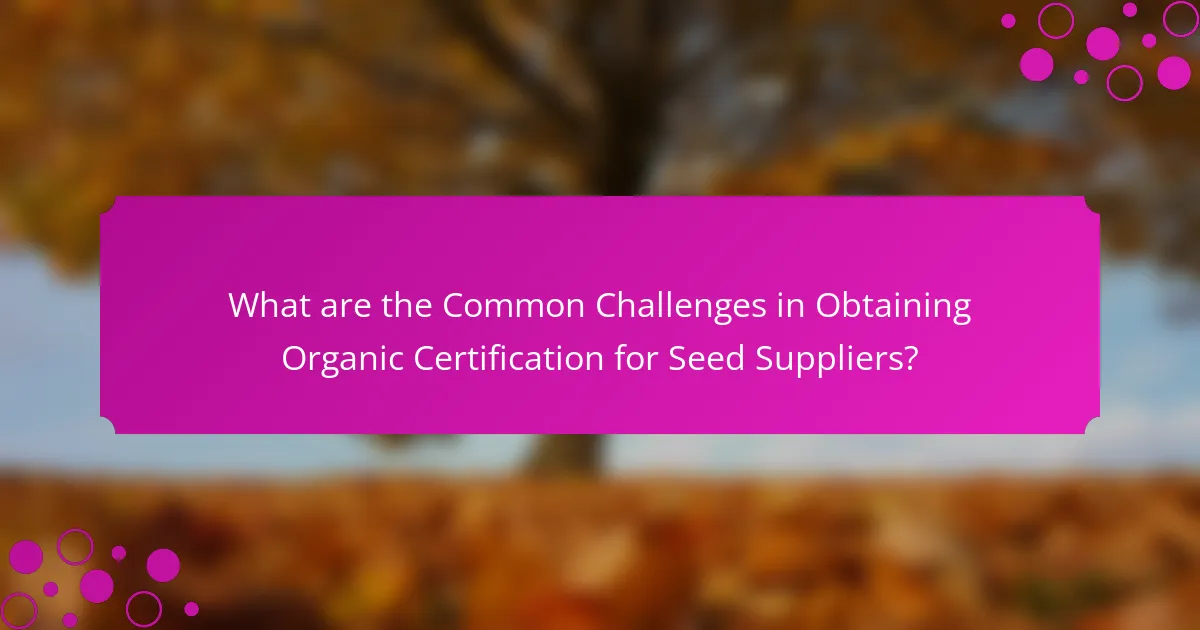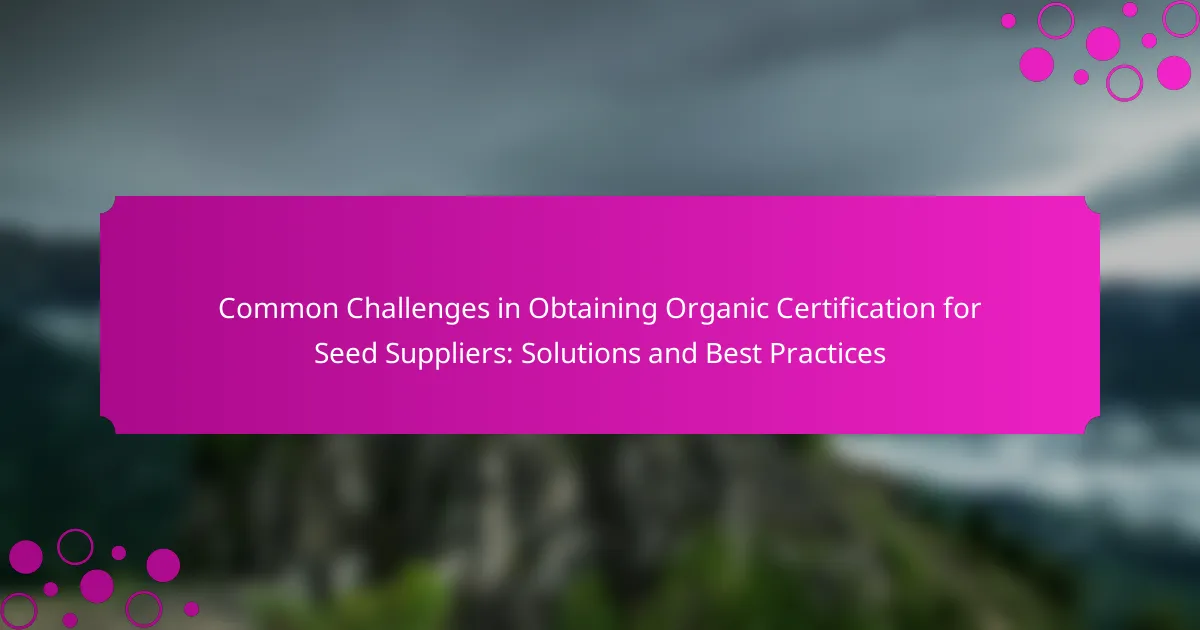Organic certification for seed suppliers involves meeting strict regulatory standards, including the prohibition of synthetic pesticides and fertilizers, and ensuring traceability throughout the supply chain. Key challenges include understanding organic practices, financial constraints related to certification costs, and the complexity of the certification process itself. Solutions to these challenges encompass thorough preparation, investment in training, regular audits, and effective documentation management. Additionally, collaboration with experienced consultants and networking with certified suppliers can enhance compliance and support successful certification efforts. Maintaining accurate records and staying updated on regulatory changes are also essential for ongoing compliance in the organic certification process.

What are the Common Challenges in Obtaining Organic Certification for Seed Suppliers?
Common challenges in obtaining organic certification for seed suppliers include compliance with strict regulatory standards. Seed suppliers must demonstrate that their seeds are grown without synthetic pesticides or fertilizers. Maintaining traceability of seed sources is also essential. This involves documenting the entire supply chain from seed production to sale. Additionally, seed suppliers face challenges in understanding and implementing organic practices. Training and resources may be limited, hindering their ability to comply effectively. Financial constraints can also pose challenges, as certification processes can be costly. Lastly, navigating the certification process can be complex and time-consuming, often leading to delays in obtaining certification.
Why is Organic Certification Important for Seed Suppliers?
Organic certification is important for seed suppliers because it ensures that seeds meet specific organic standards. This certification builds trust with consumers who prefer organic products. It also provides a competitive advantage in the market. Organic certification can lead to higher prices for certified seeds. According to the USDA, organic produce can sell for 20-100% more than non-organic. Additionally, certified seeds contribute to sustainable agricultural practices. This helps in preserving biodiversity and reducing chemical usage. Overall, organic certification is crucial for market access and consumer confidence.
What are the regulatory requirements for organic certification?
The regulatory requirements for organic certification include adherence to specific agricultural practices. These practices must avoid synthetic fertilizers and pesticides. Organic certification also requires the use of organic seeds whenever possible. Record-keeping is essential to demonstrate compliance with organic standards. Additionally, farms must undergo annual inspections by accredited certifying agents. These inspections verify that organic practices are consistently followed. Compliance with the USDA National Organic Program (NOP) regulations is mandatory in the United States. Failure to meet these requirements can result in loss of certification.
How does organic certification impact market access for seed suppliers?
Organic certification enhances market access for seed suppliers by validating the quality and sustainability of their products. Certified seeds are often preferred by organic farmers, as they meet specific regulatory standards. This certification opens doors to premium markets that demand organic inputs. According to the USDA, organic products can command higher prices, thus increasing profitability for suppliers. Additionally, certification can improve supplier credibility and brand recognition in the organic sector. A study by the Organic Trade Association indicates that organic farming is a growing market, further boosting demand for certified seeds. Overall, organic certification is crucial for seed suppliers aiming to compete effectively in the organic agricultural market.
What are the Major Obstacles Seed Suppliers Face in the Certification Process?
Seed suppliers face several major obstacles in the certification process. One significant challenge is the complexity of regulatory requirements. Different regions have varying standards that can be difficult to navigate. Additionally, seed suppliers often struggle with the high costs associated with certification. These costs can include fees for inspections, testing, and documentation.
Another obstacle is the time-consuming nature of the certification process. It can take several months to complete all necessary steps. Furthermore, maintaining compliance with organic standards requires continuous monitoring and record-keeping, which can be resource-intensive.
Lastly, seed suppliers may encounter difficulties in sourcing organic seeds or inputs that meet certification criteria. This scarcity can hinder their ability to provide certified products. Together, these obstacles create a challenging landscape for seed suppliers seeking organic certification.
How do financial constraints affect the certification process?
Financial constraints significantly hinder the certification process for organic seed suppliers. Limited funding restricts access to necessary resources, such as quality seeds and organic inputs. Suppliers may struggle to afford the fees associated with certification applications and inspections. This financial burden can lead to delays in the certification timeline. Additionally, insufficient funds may prevent suppliers from implementing required organic practices. Consequently, some suppliers may opt out of pursuing certification altogether. Research indicates that nearly 30% of small-scale farmers cite financial limitations as a barrier to obtaining organic certification. This statistic underscores the impact of financial constraints on the certification process.
What role does knowledge and expertise play in obtaining certification?
Knowledge and expertise are crucial in obtaining certification. They help seed suppliers understand the specific requirements and standards for organic certification. Familiarity with organic farming practices enhances compliance with regulations. Expertise allows for effective documentation and record-keeping, which are essential for the certification process. Knowledge of market trends can also guide suppliers in meeting consumer demands. Studies indicate that knowledgeable suppliers are more likely to successfully navigate the certification process. For instance, a report by the USDA highlights that training and education significantly improve certification outcomes for organic producers.
What are the Common Misconceptions about Organic Certification?
Common misconceptions about organic certification include the belief that all organic products are pesticide-free. In reality, organic farming allows the use of certain natural pesticides. Another misconception is that organic certification guarantees superior nutrition. Research shows that organic and conventional foods have similar nutritional profiles. Some people think organic farming is always better for the environment. However, the environmental impact can vary based on farming practices. Additionally, there is a belief that organic certification is a quick process. In fact, obtaining certification can take several years and requires thorough documentation. Lastly, many believe that all organic products are locally sourced. Organic products can be imported from other countries, which may not support local economies.
How do misconceptions affect seed suppliers’ willingness to pursue certification?
Misconceptions significantly hinder seed suppliers’ willingness to pursue certification. Many suppliers believe that certification is overly complex and costly. This perception leads to avoidance of the certification process. Some suppliers think that organic certification will not provide a competitive advantage. They may underestimate the market demand for certified organic seeds. Additionally, misinformation about the regulatory requirements can create confusion. This confusion may discourage suppliers from engaging with certifying bodies. Ultimately, these misconceptions can result in lower participation rates in organic certification programs.
What are the myths surrounding the cost of organic certification?
Myth 1: Organic certification is prohibitively expensive. Many small farmers can obtain certification for under $1,000. Myth 2: Certification costs are only initial fees. Ongoing costs include annual renewal and inspections. Myth 3: All organic certification bodies charge the same fees. Fees vary significantly by region and certifying agency. Myth 4: The process is only for large-scale operations. Small operations can also benefit from certification and often face lower costs. Myth 5: Organic certification guarantees higher profits. While it can increase market access, profitability depends on various factors. These myths can deter farmers from pursuing organic certification despite its potential benefits.

What Solutions Exist for Overcoming Certification Challenges?
Solutions for overcoming certification challenges include thorough preparation and understanding of organic standards. Seed suppliers should invest in training programs to comprehend certification requirements. Regular audits can help identify compliance gaps early. Documentation management systems streamline record-keeping and ensure traceability. Collaborating with experienced consultants provides tailored guidance. Utilizing technology can automate processes and reduce errors. Networking with other certified suppliers fosters knowledge sharing and support. These strategies enhance the likelihood of successful organic certification.
How can Seed Suppliers Streamline the Certification Process?
Seed suppliers can streamline the certification process by implementing digital record-keeping systems. These systems enable efficient tracking of compliance documents and seed varieties. Automation can reduce manual errors and save time during audits.
Regular training for staff on certification requirements is essential. This ensures that all team members understand the necessary standards. Collaborating with certification bodies can also clarify expectations and reduce misunderstandings.
Utilizing software specifically designed for organic certification can simplify documentation. These tools often provide templates and checklists tailored to certification needs.
Establishing a clear timeline for certification tasks helps prioritize activities. Setting deadlines for document submissions and audits can keep the process on track.
Maintaining open communication with stakeholders, including farmers and regulators, fosters transparency. This can facilitate quicker resolutions to potential issues.
By adopting these strategies, seed suppliers can enhance their certification efficiency and reduce delays.
What best practices can enhance the efficiency of obtaining certification?
Implementing a structured plan enhances the efficiency of obtaining certification. First, seed suppliers should conduct a thorough review of certification requirements. This includes understanding the specific regulations applicable to their products. Next, maintaining detailed records of all farming practices is crucial. Accurate documentation supports compliance and simplifies the certification process. Additionally, training staff on organic practices can minimize errors. Educated employees are more likely to adhere to standards. Regular internal audits can also identify compliance gaps early. This proactive approach allows for timely corrections. Lastly, engaging with a certification consultant can provide expert guidance. Their experience often leads to a smoother certification journey.
How can technology aid in the certification process?
Technology can significantly aid in the certification process by streamlining documentation and tracking compliance. Digital platforms allow seed suppliers to maintain accurate records of organic practices. Automated systems can track inputs and outputs, ensuring adherence to organic standards. Mobile applications facilitate real-time data collection during inspections. Blockchain technology enhances transparency by providing an immutable record of actions taken in the supply chain. Data analytics can identify trends and areas for improvement, aiding compliance. Cloud storage solutions enable easy access to necessary documents for auditors. This integration of technology accelerates the certification process and reduces administrative burdens.
What Resources are Available for Seed Suppliers Seeking Certification?
Seed suppliers seeking certification can access several resources. These include government agencies that provide guidelines and support. The USDA offers a National Organic Program with comprehensive resources. Non-profit organizations also provide educational materials and workshops. Industry associations often publish best practice guides. Online platforms host forums for peer support and information sharing. Additionally, certification bodies offer consultations and detailed requirements. These resources help seed suppliers navigate the certification process effectively.
How can seed suppliers access training and support for organic practices?
Seed suppliers can access training and support for organic practices through various agricultural extension programs. These programs are often provided by universities, government agencies, and non-profit organizations. They offer workshops, online courses, and field demonstrations focused on organic farming techniques. Additionally, seed suppliers can join local or regional organic farming associations. These associations typically provide resources, networking opportunities, and access to experienced organic farmers. Research shows that participation in such programs enhances knowledge and compliance with organic standards. For instance, the USDA’s National Organic Program offers guidelines and resources for organic certification processes.
What organizations provide assistance with the certification process?
Organizations that provide assistance with the certification process include the USDA, which offers guidance for organic certification. The Organic Trade Association also provides resources and support for businesses seeking certification. Local extension services often assist farmers in understanding certification requirements. Additionally, various non-profit organizations focus on sustainable agriculture and offer certification assistance. These organizations help navigate the complexities of the certification process effectively.

What Best Practices Should Seed Suppliers Follow for Successful Certification?
Seed suppliers should maintain accurate records for successful certification. This includes documenting seed sources, cultivation practices, and pest management strategies. Regular training for staff on organic standards is essential. Suppliers must also conduct internal audits to ensure compliance with certification requirements. Engaging with certifying agents early can clarify expectations and requirements. Implementing traceability systems helps track seed from production to sale. Collaboration with other certified suppliers can provide valuable insights and support. Finally, staying updated on regulatory changes is crucial for ongoing compliance.
How can Seed Suppliers Prepare for the Certification Audit?
Seed suppliers can prepare for the certification audit by implementing a thorough documentation process. They should maintain detailed records of seed production, handling, and distribution. Compliance with organic standards must be clearly demonstrated through these records. Suppliers should also conduct internal audits prior to the certification audit. This helps identify any potential non-compliance issues. Training staff on organic practices is essential to ensure understanding and adherence to standards. Additionally, suppliers should review their practices against the certification requirements. This proactive approach can significantly enhance the chances of passing the audit.
What documentation is essential for a successful audit?
Essential documentation for a successful audit includes financial records, internal controls, and compliance reports. Financial records provide a clear view of transactions and fund allocations. Internal controls demonstrate adherence to policies and procedures. Compliance reports verify alignment with regulatory standards. Additionally, records of organic inputs and production practices are crucial. They ensure traceability and transparency in organic operations. Accurate documentation supports the audit process and facilitates verification of organic certification compliance.
How can seed suppliers ensure compliance with organic standards?
Seed suppliers can ensure compliance with organic standards by following specific guidelines set by certifying bodies. They must source seeds from certified organic producers. This guarantees that the seeds meet organic criteria from the beginning. Additionally, suppliers should maintain detailed records of all seed transactions. Documentation should include the origin, handling, and storage conditions of the seeds. Regular training for staff on organic regulations is essential. This helps to keep everyone informed about compliance requirements. Suppliers should also conduct periodic audits of their processes. This ensures adherence to organic practices and identifies areas for improvement. Finally, staying updated on changes in organic regulations is crucial for ongoing compliance.
What Tips can Seed Suppliers Implement for Long-term Certification Success?
Seed suppliers can implement several tips for long-term certification success. First, they should maintain detailed records of all seed production processes. Accurate documentation helps demonstrate compliance with organic standards. Second, they must regularly train staff on organic practices and certification requirements. This ensures everyone understands their roles in maintaining compliance. Third, establishing strong relationships with certifying agents is crucial. Regular communication can help address potential issues before they escalate. Fourth, suppliers should conduct internal audits to assess compliance regularly. This proactive approach identifies areas for improvement. Fifth, investing in soil health and sustainable practices enhances the quality of seeds produced. Healthy soils lead to better crop resilience and yield. Lastly, staying updated on changes in organic regulations is essential. This knowledge allows suppliers to adapt quickly and maintain certification.
How can continuous education improve organic practices?
Continuous education can enhance organic practices by providing updated knowledge and skills. It enables farmers to learn about new organic farming techniques. This includes advancements in pest management and soil health. Educational programs can also cover regulatory changes in organic certification. Access to workshops and seminars fosters community engagement among organic growers. Studies show that educated farmers often achieve higher yields and better quality produce. Research indicates that ongoing training leads to improved sustainability in farming practices. For instance, a study by the Organic Farming Research Foundation highlights the benefits of education in organic crop production.
What strategies can help maintain compliance after certification is achieved?
Regular audits and reviews are essential strategies to maintain compliance after certification. Conducting periodic internal audits helps identify any deviations from organic standards. Training staff on compliance requirements ensures everyone understands their role in maintaining standards. Implementing a robust record-keeping system supports transparency and accountability. Engaging with certifying bodies for guidance fosters a collaborative compliance environment. Staying updated on regulatory changes is crucial for ongoing adherence. Lastly, establishing a culture of continuous improvement encourages proactive compliance efforts. These strategies collectively enhance the likelihood of sustaining organic certification.
The main entity of the article is organic certification for seed suppliers. The article outlines the common challenges faced by seed suppliers in obtaining organic certification, including regulatory compliance, financial constraints, and misconceptions about the certification process. It emphasizes the importance of organic certification for market access and consumer trust while providing solutions and best practices to overcome these challenges. Key topics include the regulatory requirements, obstacles in the certification process, the role of knowledge and expertise, and strategies for maintaining compliance after certification is achieved.
